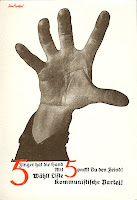Nihilism in Germany around the early nineteenth century can be determined by various movements: artistic, religious, economical, political, cultural. Writers, painters, musicians, community organizers or politic party leaders especially in Germany, who broadcasted negative social issues through paintings and mass communication like the cinema in order to clearly govern and emphasize new approach or strategy plans to reform the previous government that was divided into different socio-economic class.
Some political parties that existed were: The socio democratic party, the largest party but depended on other parties like the Catholic Center Party and the German Democratic Party (Deutsche Demokratische Partei, DDP) to form a majority. The DDP was made up of left-leaning liberals and intellectuals like Max Weber, this party was the weak link in the chain however and could not deliver enough of the votes. After 1920 this coalition never received a majority again. In order to form a majority government a “Grand Coalition" would have to include the conservative, right-leaning parties, like the German People’s Party (Deutsche Volkspartei, DVP) that represented big business interests, or the German National People’s Party (Deutschenationale Volkspartei, DNVP) which represented the remaining feudal nobles and was the most conservative class in Germany outside of the Nazis.
Dadaism as a worldwide movement had begun. Many figures of Dada change in "tactics" from revolutionary Nazism seizure of power in the state to artistic production is relevant in itself as it suggests a retreat from more direct modes of confrontation with political authorities.
Jünger endorses the historical theory stating that liberalism basically died during the World War I and we have now entered a "post-liberal" phase in history. This approach is parallel to the famous Nietzsche–who is Nihilistic based on his statement that "God is dead"; ,and the religious sector of German’s society is established on the purpose to generate wealth, to make science and new technology, innovations accessible to a group of individuals. Moreover, Jünger's lament over the conditions of modern life and the loss of values are in his view this loss is nihilistic.
However, not many writers can bring you in to the "eye of the storm" so to speak and provide a sociological and cultural analysis of life inside Nazi Germany–even if Jünger is careful to avoid any explicit reference to the Nazi party. At many points it seems as if the essay is to provide a strategy for how to adapt to life like this, which is basically be an obedient worker and do what you are told.
For most conservatives the pain of life from Junger vision, dissolves–or negates–the structures of "metaphysics," systems of ideas based on concepts like: freedom, justice, and progress. In a very real sense pain is the ultimate reality; the others are illusions.
The development of Marxist thinking to take into account cultural and psychological factors to better explain the resistance of the workers to revolutionary politics was one of the prime motivations for the establishment of institutions like the Institute for Social Research, also known as the Frankfurt School.
The history impact of these Dadaism artists to present day as quietly change ruling party in Germany the Christian Democratic Union is still conservative but favors government intervention in economic matters. The modern day version has unified Catholics and Protestants (divided along Southern and Northern regions in Germany), who were still separate during the early 20th century. The social democratic party was supposed to represent the working class, and for decades it did.


